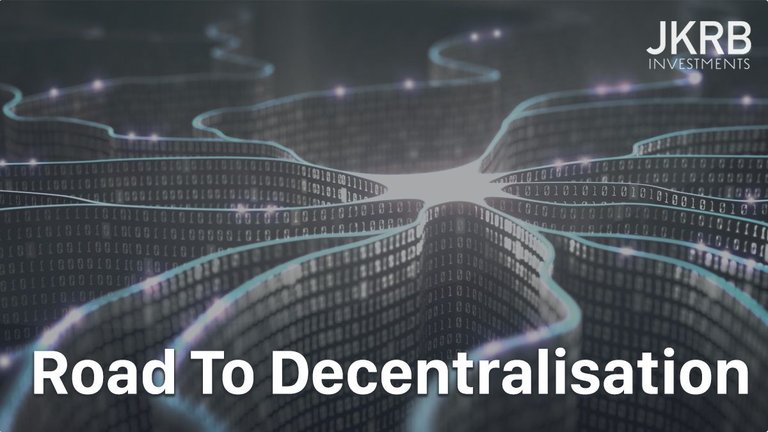
Blockchain technology is only one piece of the puzzle to solve decentralisation.
Lets explore the building blocks that realise a fully decentralised online future.
Digital Value
Cryptocurrencies are the flagship use case of a decentralised application.
We have already witnessed that people from around the globe do want a decentralised form of monetary value, taking into consideration the huge growth of Cryptocurrencies in their infancy form.
Smart Contracts
Throughout 2017 we saw some huge ICOs and decentralised application ideas being introduced to the market, paving the way for smart contract controlled applications, eliminating the need of a trusted entity to make decisions.
Distributed Assets
Beyond this, we have seen the initial adoption of IPFS in its early phases, which is proving to be a vital piece of the puzzle of decentralisation. IPFS allows the storage of public data on a distributed network. By launching your own IPFS node, you can store data such as images, video and text that will be hashed and stored in small data chunks on your node, and distributed accordingly.
With the understanding that you can store your static public files in a decentralised manor, this solves another problem on the road to decentralisation.
IPFS has versioning of every file it hosts, therefore a history of changes can be logged for your application.
Decentralised Data Storage
Upon exploring storage of secure data in a decentralised manor, we can conclude that these are challenging problems to overcome.
We have seen Blockchain startups such as EOS attempting to tailor a full solution to this problem. The database API of EOS.IO DAWN release contains two modules, allowing interaction to the database via C or C++. EOS is a likely candidate to fully solve this issue, having raised $137 million in their ICO period.
Another candidate, TiesDB, raised $9 million in their ICO, and are now working towards an Alpha release of their decentralised mutable database product.
Both of these services adopt a pay to use approach, trading tokens for database querying. The cost of querying will depend on the token price, which will be fully determined when the products are publicly released.
Decentralised Github
Git’s downfall of decentralisation is it’s remote endpoints for synchronisation. The two most widely used protocols are Git over SSH and Git over HTTP — both are centralised, which lead to single points of failure.
A proof of concept called Mango (https://github.com/axic/mango) has demonstrated this problem can be solved. All Git objects (metadata and data) are stored on IPFS , while an Ethereum smart contract provides means for access control and stores the pointers to the latest repository revisions.
Front End Delivery
Having access to a project from a distributed network, we can now download the project onto a local machine, either in a compiled or uncompiled state (or both).
Having light weight nodes of various distributed networks and Blockchains pre-installed on an OS may be a viable solution in a world where decentralised applications are dominant, eliminating the single point of failure problem.
Mesh Networks
ISPs are centralised entities that provide internet access. Although the internet as we know it today relies on ISPs, there is a growing interest in mesh networking and P2P networks to provide an alternative means of accessing data across geographies.
Currently, all Internet data is sent from a user’s devices to a central routing station operated by an ISP, which then routes the data to its intended address.
With mesh networks, however, all devices are connected with wireless signals (wired connections are also possible but considered impractical due to the sheer bulk of wires required).
Although mesh networks have been used in both military and emergency relief efforts since the 70s, they have only recently become viable for civilian use as the cost of hardware has decreased.
Beyond hardware, the easy access to renewable energy systems makes powering these networks possible without the reliance on centralised energy companies; with solar energy now being cheaper than coal, it is very economically incentivising to adopt such solutions.
As technical boundaries continue to be lifted, the road to a fully decentralised online economy is truly underway. How will your company transition to such an economy?